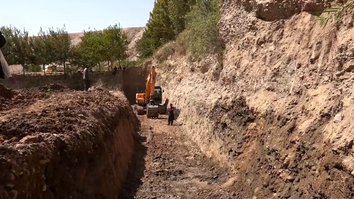KUNDUZ -- The World Bank is planning to implement dozens of irrigation projects in Faryab province starting later this month, say local officials.
Abdul Hakim Hekmat, director of the northern region’s river basin department based in Mazar-e-Sharif, told Salaam Times that 59 projects for managing water resources with a total budget of 251 million AFN ($2.9 million) will be launched and completed within the next six months.
These projects will include rehabilitating irrigation infrastructure such as dams, irrigation canals, retaining walls and water intakes, Hekmat said.
Village elders, directors of farmers' associations and members of community councils told Hekmat in a meeting on February 17 that they wanted these projects to be implemented in Qaisar, Almar, Pashtun Kot and Bulcharagh districts.
"Our farmers are facing serious problems with water shortages and some areas even lack of irrigation water. We have, therefore, prioritised these projects to commence in Hamal [the first of month of the next solar year, which starts on March 21]," he said.
"Of these projects, six will support the building of water reservoirs in these districts with a total budget of 57 million AFN ($660,000)," he said.
The projects will not only ensure access to irrigation water but also create jobs for hundreds of farmers, according to Hekmat.
Improving the economy
Because of water shortages, farmers' harvests have suffered great losses in recent years, Abdul Wahab, 52, a tribal elder from Faryab's Qaisar district, told Salaam Times.
"Without proper irrigation infrastructure such as intakes, canals and retaining walls, Afghan farmers have suffered greatly," said Wahab.
"If water intakes are built, not only would our water resources be managed properly, but our farmers would prosper as they can utilise their farmland and harvest twice a year," he added.
"Unfortunately, drought and conflict have affected farmers in recent years. If our farmers' problems are addressed, the amount of our domestic products will increase, and the country's economy will improve," he said.
Farmers for the past five years have suffered from drought, and their produce has decreased by about 50%, Mansour Qadiri, a resident of Maimana city, the capital of Faryab province, told Salaam Times.
"Farmers across all districts in Faryab province used to sell their products such as wheat, corn, rice and mung bean as well as fruits like peaches, apricots, apples, pears, and grapes in Maimana city. But recently, farmers' yields have fallen significantly from the flooding of irrigation canals," he said.
The decline in agricultural production has led to higher prices in the local market, and because the people of Faryab are already in a fragile economic state, they cannot food at higher prices, he added.
"If the problems of our farmers, especially their access to irrigation water, are addressed, the price of food will certainly decrease at the market and the farmers' economic situation will improve," he said.
Seasonal flooding
The World Bank projects come amid other efforts to help the province's farmers.
"The construction of the Dahan-e Dara dam, which started during the previous government but was suspended after its collapse, has recently resumed," Ghulam Sadiq, 45, a farmer in Pashtun Kot, told Salaam Times.
The completion of the dam will not only help farmers in Pashtun Kot but also those in Almar and Qaisar districts, he said.
Sadiq noted the environmental ravages that have hit Afghan farmers in recent years.
"Seasonal flooding over the past five years has destroyed many irrigation canals and dams, and thousands of acres of agricultural land have dried up," Sadiq said.
"I have 20 jeribs of land that can yield two seasons of crops per year. Because of the shortage of irrigation water, I have no choice but to cultivate crops that don't need a lot of water."
"If there is enough water, I can grow wheat and rice because the demand for those products is very high and I can earn more to improve my family's economic situation," he added.
Many farmers like him are facing poverty because they have been affected by the lack of sufficient water and impacted by drought over the past five years, said Sadiq.

![A small irrigation canal that was built by the previous Afghan government in Khwaja Sabz Posh district, Faryab province, is shown in this photo last May 15. [Abdul Mateen Mirzabig]](/cnmi_st/images/2022/03/11/34462-a__1_-585_329.jpg)







This is good news. If the World Bank or any other foundation wants to help us, they may do it through such projects. We have recently been given only a handful of humanitarian aid, one-fifth of which does not reach the deserving Afghans. The benefit of these projects is that on the one hand, it employs people, and on the other hand, it will benefit the people in the long run. They will use it for years to come. This keeps people busy. They will make money and prevent theft, corruption, looting, drug addiction, and many other harmful activities.
Reply2 Comment
It is a pleasure that water problem of farmers are being resolved. As security is tightened in Afghanistan, international organizations should participate in reconstruction. These works should be done not only in Faryab but all over Afghanistan. Afghanistan is an agricultural country. The more the agriculture sector grows, the more people will benefit from it.
Reply2 Comment